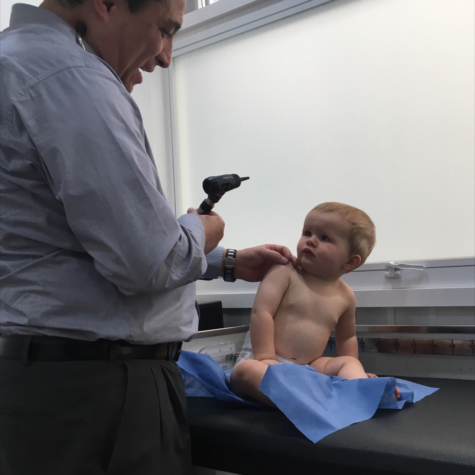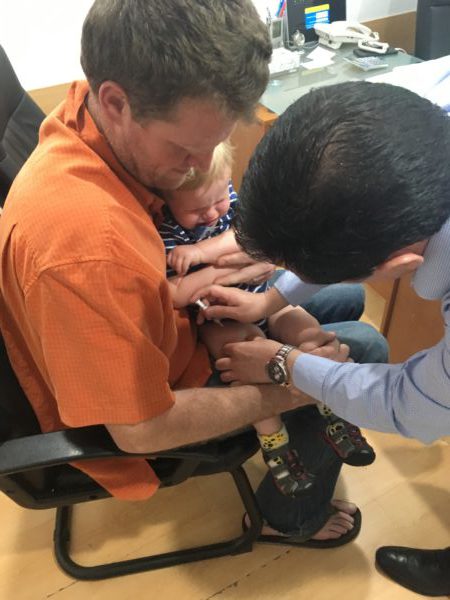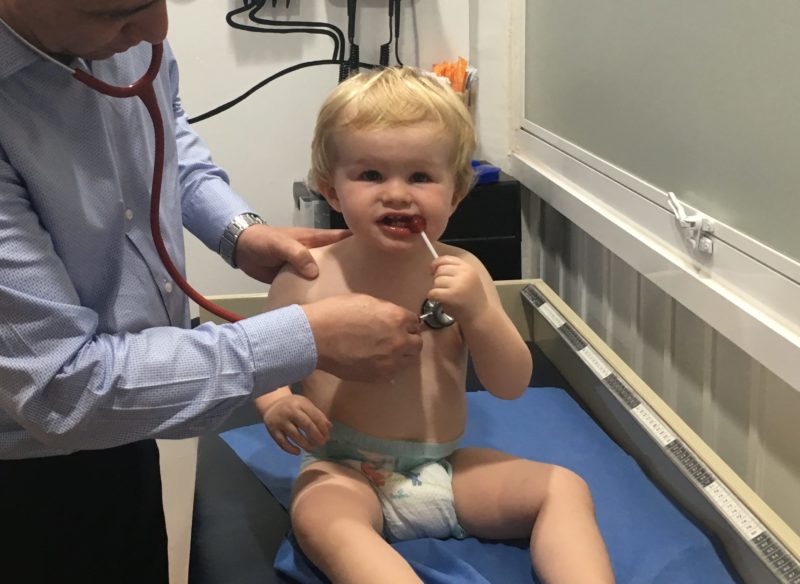This story ran last year after an especially turbulent trip to the pediatrician. It has since appeared in a different form on the NPR Shots blog.  I am a man of science. Okay, perhaps not of science, but certainly near it. I’m science adjacent. But regardless, I consider myself to be bound, in the end, by logic and facts.
I am a man of science. Okay, perhaps not of science, but certainly near it. I’m science adjacent. But regardless, I consider myself to be bound, in the end, by logic and facts.
As such, I like to think that I eschew my beliefs for what the facts tell me. As a very young man, I was very taken by the promise of herbal supplements. But as I came to understand the data (or lack thereof) behind them, I gave up on them. I used to worry about GMOs affecting my health until I dug into the actual science and realized that they are totally harmless (though not necessarily great for developing economies). I’m embarrassed to admit it, but in my overwhelmingly white college I thought that America was post-racial. But well-crafted arguments and data showed me I was wrong.
In every case, I abandoned what I thought for what I could prove. I try to keep an open mind and I tell myself I am ruled by logic. This was the mantra for my book on suggestibility and has become a guiding principle not just in my career but in my life.
It’s also utter self-delusion. The sight of one little needle turns me into a raging anti-vaxxer.
Before I go any further, just so we are clear, every scrap of reliable data confirms that vaccines are a safe and crucial part of medicine. Plenty of very clever people have pointed out that there is no discernible danger in vaccines and lots of benefits to herd immunity. Heck, people on this blog do it all the time, like Cassie, Erika, and, well, me.
Autism is heavily influenced by our genes, which have nothing to do with vaccines (though only about a quarter of the genes involve have been discovered so far and none of them account for more than one percent or so of the total people with autism). It’s true that there may be some environmental factor playing a role in autism but none have been positively identified. Vaccines were a contender for a hot second in the 90s but we now know without a doubt that they are not involved.
Lastly, let me make clear there is nothing wrong with having autism. Most people on the spectrum have fulfilling lives and many would not trade their brain for a neurotypical one even if they could.
But this is not a post about vaccines or autism or even evidence. This is a post about fear. If there is one thing that psychologists can say for sure it’s that fear is more deep and powerful than just any other emotion we can experience.
 In fact, if Albert Brooks and Meryl Streep are correct, overcoming fear is the entire point of our existence.* In my book, Suggestible You, I note that while placebos can be incredibly potent in certain (often chronic) diseases, their alter egos – nocebos – are reliably more so. Nocebos, in case you are unfamiliar, are when something unhealthy happens to your body, solely based on belief. In other words, if placebos are hope, then nocebos are fear.
In fact, if Albert Brooks and Meryl Streep are correct, overcoming fear is the entire point of our existence.* In my book, Suggestible You, I note that while placebos can be incredibly potent in certain (often chronic) diseases, their alter egos – nocebos – are reliably more so. Nocebos, in case you are unfamiliar, are when something unhealthy happens to your body, solely based on belief. In other words, if placebos are hope, then nocebos are fear.
So fear is more powerful in the body than hope. I even once tested this theory by getting myself cursed by a witchdoctor, just to see what the fear would do to me. But even then, I never thought fear could force me to throw logic completely out the window.
Which is why it was weird when – at the first vaccine appointment for my son – I started peppering my his pediatrician with questions. I inspected the boxes, telling myself that I was concerned about a recent bad batch of vaccines in Chiapas that made a bunch of kids sick. But really, I was looking for a label that read “Not the autism kind of vaccine.”
 I felt really uncomfortable and started to sweat. I looked at the clear liquid and wondered, will I regret this for the rest of my life? I started to think about maybe delaying the injections until it was safer or maybe stretching them out over a longer period of time. I mean, it just can’t be safe giving all these vaccines at once.
I felt really uncomfortable and started to sweat. I looked at the clear liquid and wondered, will I regret this for the rest of my life? I started to think about maybe delaying the injections until it was safer or maybe stretching them out over a longer period of time. I mean, it just can’t be safe giving all these vaccines at once.
Seriously? Years I’ve spent following this debate, reading the stories and writing a few about how safe and effective vaccines are. And yet here I am putting my entire profession to disgrace, just as scared and confused as anyone else. In that moment I wanted to slap my brain upside the temporal lobe.
Saying “fear is a powerful thing” is a little like saying “money can come in handy” – it kind of undersells it. Fear is the number one tool for selling newspapers, insurance, snake-oil medicine, and Swedish cars. Sometimes that’s a good thing and sometimes it’s not. It’s what kept our ancestors alive for millions of years and its history’s favorite way of selling political ideology.
So it’s not surprising that fear forces people people from across the political and economic spectrum to accept some strange ideas. The most tragic and extreme of these that I have found are cancer patients terrified of modern cancer therapies (though with good reason; many involve some form of either poisoning or irradiating yourself in the hopes of getting a few rebellious cells with the nuclear holocaust you unleash on your body).
Eventually fear drives them towards more “natural” solutions like vitamin infusions, diets, or crystal therapy. And by and large, these decisions kill them. Accurate numbers are hard to come by in this realm because so many cancer patients mix and match alternative with conventional. Also, it’s hard to tell who has relied on alternative cancer therapy because if at some point they end up in a hospital then technically they die under a conventional doctor’s care.
But the fear of a cancer patient is nothing compared to the fear of a parent. I would gladly suffer a few rounds of chemotherapy to prevent harm from coming to my child. The bottom line is that what happens to me – I assume many of the antivaxxers out there – when I go in for my kid’s shots has nothing to do with vaccines or mercury or thimerosal or any science whatsoever. It’s about fear and a loss of control.
 Imagine if someone told you that walking across a field at midnight might cause you to get eaten by a dragon. At first you might laugh. But what if everyone you know said it? What if you knew people who had disappeared after crossing that field late at night. I’m not saying that you’d go all Matthew McConaughey and start riding around in a dragon-killing tank but are you telling me that if you had to get somewhere at midnight you might not pick another route?
Imagine if someone told you that walking across a field at midnight might cause you to get eaten by a dragon. At first you might laugh. But what if everyone you know said it? What if you knew people who had disappeared after crossing that field late at night. I’m not saying that you’d go all Matthew McConaughey and start riding around in a dragon-killing tank but are you telling me that if you had to get somewhere at midnight you might not pick another route?
And the more it lingers in the back of your mind, the more real it becomes. Maybe I’ve done one too many stories on autism and crossed some kind of threshold. That’s how I ended up sweating in the doctor’s office again last week, waiting for the dreaded year-and-a-half vaccination that would protect him from diphtheria, meningitis, whooping cough, and tetanus. The one that everyone in fringe autism blogs talk about. Here I was, deeply ashamed yet still wondering if we should put off the shot until it was safe.
 The doctor asked me to restrain my son, who looked at me a little bewildered but trusted his Daddy, who would never intentionally hurt him. Then the doctor injected four dead viruses (not actually dead viruses, but I neither knew that nor cared at the time) into his legs. The baby screamed for a few seconds with what I assumed was a deep sense of personal betrayal before the doctor deftly pulled out a tin of lollypops and slipped one into his mouth. I gotta give the guy some credit, the kid shut right up and went to work on the candy.
The doctor asked me to restrain my son, who looked at me a little bewildered but trusted his Daddy, who would never intentionally hurt him. Then the doctor injected four dead viruses (not actually dead viruses, but I neither knew that nor cared at the time) into his legs. The baby screamed for a few seconds with what I assumed was a deep sense of personal betrayal before the doctor deftly pulled out a tin of lollypops and slipped one into his mouth. I gotta give the guy some credit, the kid shut right up and went to work on the candy.
Then at that moment, I had a realization. If fear is more powerful than hope and this could happen to a fundamentally rational person like me, then what hope does science really have? What chance does “this is a well-studied, safe intervention” have against “holy shit, you might be ruining your child!”?
Now go beyond that to other issues where fears and tribal loyalties conflict with reason, like GMOs, climate change or evolution. How can rationality win when irrationality is so much more attractive? I sat in the doctors office staring into space, now terrified of something totally different.
The doctor looked at me for a second, then grabbed his tin and pushed it at me. “Maybe Daddy wants a lollypop too?”
Photo Credit: Erik Vance
The project Suggestible You was supported in part by The Pulitzer Center on Crisis Reporting.
* And yes, I’d say they are. If you have not seen this film, it’s an absolute classic.
